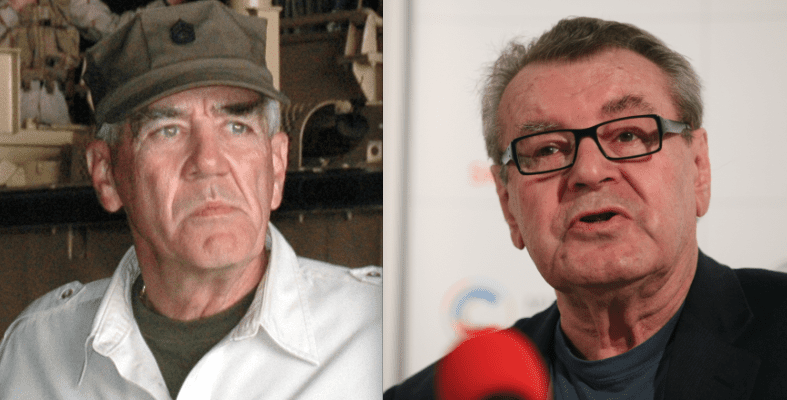Milos Forman, R. Lee Ermey: More Than Movie Originals
By • April 16, 2018 0 804

The world of movies and movie-makers and making is a universal circus — even now in the age of super heroes and Marvel Comics.
The movies are populated and peopled by originals at almost every level: actors and stars, with big egos and the fill-ins without whom the movies would seem less rich, more thin, less like life, and the directors, both the churning professionals, the Hollywood legends (John Ford, Clint Eastwood) and the announced artists (Bergman, Fellini, Welles).
Here’s to the men and women, the actors and actresses who embody the definition of the idea that there are no small parts.
Here’s to the men and women, the directors who insist that movies—however popular—are meaningful examples of art in their vision of human beings on both a grand and intimate scale.
The movie world lost two of its most original originals in the last few days.
We pay tribute to Milos Forman, the Czech native who gained international recognition with small, black-and-films made at a time when Americans discovered foreign films to the point of fetish, then came to America and expanded his artistic canvas and vision with enduring epics, such as “One Flew Over the Cuckoos Nest” and “Amadeus.”
The grim, knife-edged and thin actor R. Lee Ermey, made quite a few movies, but in truth, he will always be the marine, specifically Gunnery Sergeant Hartman, the demeaning, brutal, tough marine who weeded out the weak from the strong on their way to the battle cauldron that was Viet Nam in director Stanley Kubrick’s sometimes frightening “Full Metal Jacket.”
Both men passed, Forman at the age of 86, Ermey of the effects of pneumonia just day after his birthday at the age of 74.
They left behind movies, scenes and strands of imagery and stories, and in Ermey’s case a kind of daily personal and professional role of a gruff United States Marine, which he earned the hard way with 14 months of service in Viet Nam.
He played soldiers, mercenaries, non coms, rarely an officer, with a range that included, yes, “Toy Story.” He was outspoken, often. He was also seen on the History Channel with “Mail Call” and a weapons-oriented show, “Lock n’ Load with R. Lee Ermey.”
He was raised with five brothers on a farm just outside Kansas City, Kansas, and ended joining the Corps due to some run ins with the law of the kind that unruly teens seem to make. He served with the Marine Wing Support Group 17 at the Marine Corps Air Station Futenma in Okinawa, Japan, which ended up service 14 months “in country.” He rose to the rank of staff sergeant (E-6) and in 2002, and received an honorary promotion to gunnery sergeant by General James L. Jones, then Commandant of the Marine Corps.
Ermey had worked on movies before, but it was Kubrick who picked him for the role of the harsh drill instructor, an unforgettable role. Vincent D’Onofrio, who rose to fame later in the “Law and Order, Criminal Intent” television series, was his foil, a clumsy, sad, overweight recruit who was constantly harassed and bulled by the sergeant, whose decibel level was set at unbearable.
In his youth, Forman lost both of his parents to German concentration camps. His American movies tended to be both big in theme and content, and oddly, given their cost and scope, rebellious in nature, the kind of films that championed creativity and individuality in art (“Amadeus”), freedom from suppression by authoritarian figures (“One Flew Over the Cuckoo’s Nest” as well as the film version of “Hair). There was also the paean to the immigrant spirit in a time of vast change in America with the film version of “Ragtime.” Even in big films, Forman managed to go to the edge and borders of the eccentric and extreme personality, as in Larry Flynt the Hustler publisher who was the subject of “The People vs. Larry Flynt,” starring Woody Harrelson, and “The Man in the Moon,” a cinematic portrait of the out-there comedian Andy Kaufman, who seemed to aspire to stardom in the world of wrestling.
Forman won two Oscars for directing for “Cuckoo’s Nest” and “Amadeus” and had a gift for creating new and unique worlds, while drawing great performances from the likes of Jack Nicholson, the near-unknowns like F. Murray Abraham and Tom Hulce and Louise Fletcher, as well as Harrelson as Flynt.
The quality his films shared, in spite of being made on big-budget Hollywood scales, was a quality he shared as an artist with R. Lee Armey.
They were originals.

